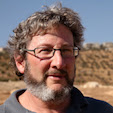Jack C. Doppelt
April 2024
This year’s Haggadah seemed destined to be different in large part because of the complexities of the struggles throbbing in the Middle East. Surprisingly and poignantly, not much changing is needed. The places, the terms (Holy Land, Promised Land, Bible, exodus, desert, plagues), the themes, the introspection, even the jarring lessons of being the oppressed and the oppressors have been in our Haggadah all along. All that’s needed is to listen more intently, be more aware of suffering and of empathy, and truly recognize how the history of humanity and inhumanity keeps resonating.
In 2014, I was teaching in the West Bank and wrote these reflections: Because We Can? Pondering Oppressor and Oppressed. We incorporated it into our Haggadah.
The driving force of any Passover is the telling and retelling of stories so memories are more likely to be preserved. Take this one with you, whether you celebrate, respect Jewish traditions or not:
As I was putting this year's updates to bed, a friend discovered a story in Washington Monthly, called "From The Edges of a Broken World: The article Guernica retracted, and the translator who tried to tread the line of empathy." It's worth reading.
In it, Joanna Chen, the author, quotes from poetry lines that others have written over the years. Many are translated from Hebrew or Arabic. They help bottle the empathy Passover needs to preserve.
 |
| Joanna Chen |
"The tree lost its mythical powers,
horses huddled at the edge of the earth.
The sniping light turned cold, winter came,
we continued, faces sealed. Only at night
did we sit down with our own names.
How can I mourn the distance of years,
of waste, of your silence seeping into the earth."
--“The End of Naivete” by Yonatan Berg in Frayed Light
"You hand me a clean handkerchief,
Ripe figs. I have been moving away
For years"
--“Remembrance” by Yonatan Berg in Frayed Light
"By the time the knock at the door came, I was dead.
Who’s there? asked the photo in the frame.
It is me, I said. I came back to wipe the dust off you."
--“To My Mother” by Yonatan Berg in Frayed Light
"Your morning is the morning of others.
Your evening is the evening of others
And we frequently set traps for birds."
--untitled, by Nasser Rabah, in Arrowsmith (translated collectively by Joanna Chen, Julie Yelle, and Mosab Abu Toha)
"No flag flutters for me,
No bird alights upon the window.
I am a clock on the wall."
--“The Evening of Others,” published in Chen's 2017 blog in the Los Angeles Review of Books
"I want to be your foliage,
Dense and cool against the heat,
But I am dry thorns on a hilltop"
--“Hebron” in Frayed Light
"I want to be innocent of every line I ever wrote,
I want to cry on every hand that ever hovered over the cover of a book.
A flock of vocabulary jostles at my window, hammers at my heart."
--untitled, by Nasser Rabah, Los Angeles Review of Books
"The hand still moves across the page
and on the balcony plants lean forward,
long-necked, into the sun."
--“Report from a Free City” by Yonatan Berg in Frayed Light
#####



